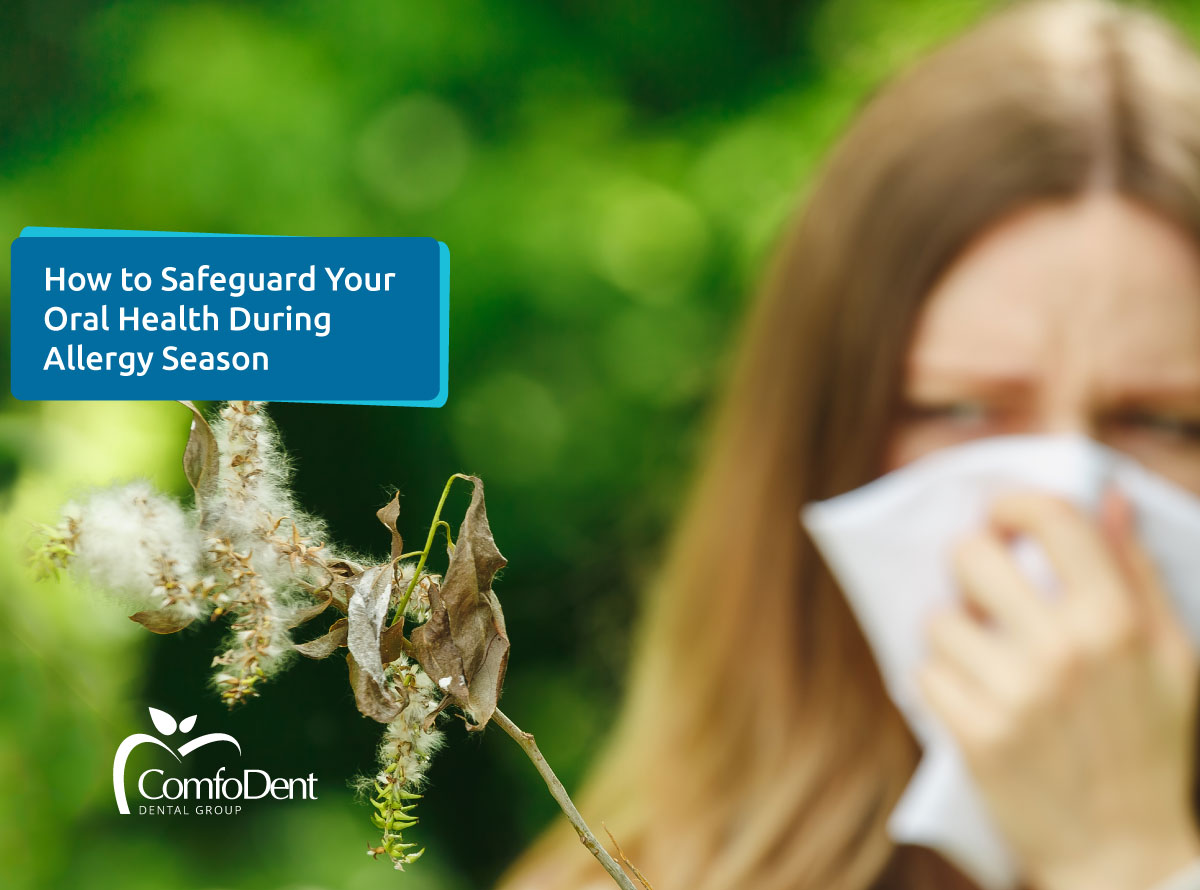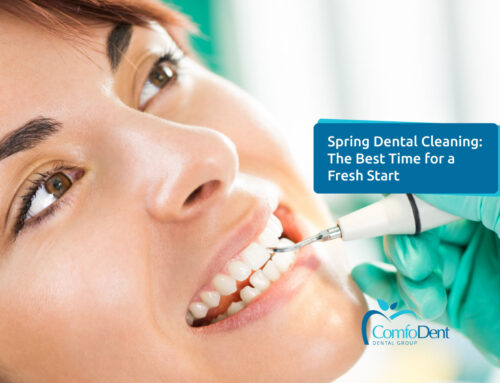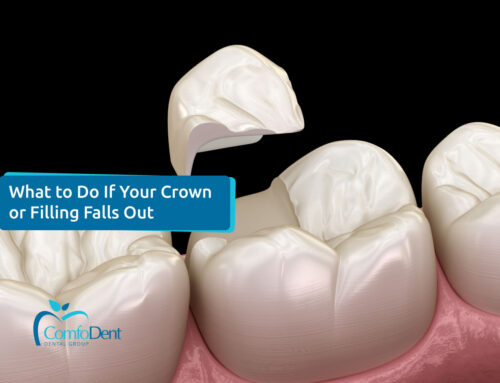Seasonal allergies can make life uncomfortable—sneezing, itchy eyes, and a stuffy nose are common symptoms we expect. But did you know that allergies can also affect your oral health? At Comfodent Dental Group, we believe in taking care of your smile year-round, and that includes helping you navigate allergy season without compromising your dental health. From dry mouth to sinus pressure, let’s explore how allergies impact your teeth and gums—and what you can do about it.
Common Allergy-Related Oral Health Issues
Seasonal allergies can indirectly cause several dental problems. Understanding these issues can help you stay ahead and protect your smile.
Dry Mouth from Allergy Medications
Antihistamines are often necessary to control allergy symptoms, but they come with a side effect: dry mouth. Without enough saliva to rinse away food particles and bacteria, you may face a higher risk of:
- Tooth decay
- Gum disease
- Bad breath
Saliva also neutralizes acids that cause enamel erosion. When it’s lacking, your teeth become more vulnerable.
Tooth Pain from Sinus Pressure
Congested sinuses can create pressure around the upper jaw, mimicking the sensation of a toothache. This discomfort often affects the molars and can be confusing for patients who aren’t sure whether it’s dental or sinus-related.
Post-Nasal Drip and Bacterial Buildup
Excess mucus dripping down your throat can irritate your mouth and throat and contribute to halitosis (bad breath). This buildup of mucus may also increase the growth of harmful bacteria along the gum line.
Mouth Breathing and Gum Inflammation
When your nose is congested, you’re more likely to breathe through your mouth—especially while sleeping. This habit dries out your oral tissues, increasing your risk for:
- Gum irritation
- Tooth enamel wear
- Changes in your bite over time
Tips to Maintain a Healthy Smile During Allergy Season
Even with allergy symptoms in full swing, you can take proactive steps to care for your teeth and gums.
Stay Well Hydrated
Drink plenty of water throughout the day to counteract dry mouth and help wash away allergens and bacteria from your mouth.
Keep Up With Oral Hygiene
Allergy symptoms can make you feel sluggish, but don’t skip brushing or flossing. Staying consistent with your dental hygiene helps fight plaque buildup and supports your immune response.
Use an Alcohol-Free Mouthwash
An alcohol-free, hydrating mouthwash can soothe your gums and combat dry mouth without further irritation. Look for one with fluoride or xylitol.
Avoid Sugary Cough Drops and Lozenges
Cough and throat relief products are popular during allergy season—but many are high in sugar. Choose sugar-free options to prevent cavities.
Run a Humidifier at Night
A humidifier can add moisture to your bedroom air, helping you breathe easier and keeping your mouth from drying out overnight.
Schedule a Checkup with Us
Allergy season is a perfect time to visit Comfodent Dental Group for a preventive checkup. We offer dental cleanings, oral exams, fillings, and custom night guards to help you protect your smile no matter the season.

When to Visit the Dentist
If you’re experiencing allergy symptoms and notice any of the following, it’s time to book a dental visit:
- Persistent dry mouth
- Tooth pain that doesn’t subside with decongestants
- Bleeding or inflamed gums
- Chronic bad breath
- Jaw soreness or bite discomfort
Your oral health can be affected by more than just what you eat—it’s also influenced by seasonal changes, medication, and how your body reacts to allergens.
FAQ
Can sinus pressure really make my teeth hurt?
Yes, especially your upper molars. The roots of those teeth are close to your sinuses, and congestion can create referred pain.
Is it okay to use allergy medicine every day if I have dry mouth?
Yes, but balance it by drinking more water, using a humidifier, and possibly switching to a milder option. Talk to your doctor or dentist if symptoms persist.
What if I keep waking up with a dry mouth during allergy season?
Mouth breathing is likely the cause. Try using a humidifier and nasal sprays to help with congestion and reduce dry mouth at night.
How can I tell if my tooth pain is from allergies or a real cavity?
Tooth pain from sinus pressure usually affects several teeth and feels like a dull ache. A cavity typically affects one tooth and may feel sharp. Visit our office to get a proper diagnosis.
Are allergy-related dental problems common?
Yes! Many people overlook the oral effects of seasonal allergies. Regular dental checkups can help catch and manage these issues early.
Conclusion
Allergy season can take a toll on more than your sinuses—it can affect your teeth and gums, too. From dry mouth to sinus-related pain, it’s important to stay proactive. At Comfodent Dental Group, we offer comprehensive dental care to help you manage your oral health during every season. Whether it’s time for your regular cleaning or you’re noticing new symptoms, we’re here to support your smile.
Don’t let allergies affect your smile. Book your appointment with Comfodent Dental Group today. With services including cleanings, fillings, custom night guards, and complete family dental care, we’ll help keep your oral health in top shape all year round.






